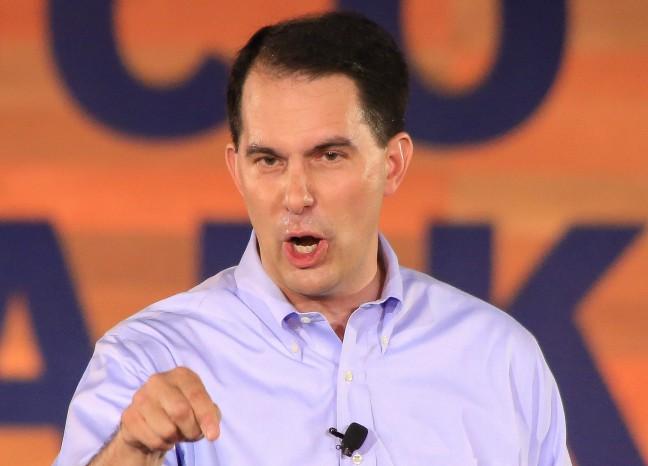The roller coaster ride that was Gov. Scott Walker’s presidential campaign has come to an abrupt end.
He and his staff are departing from the campaign gate. Many were expecting Walker to be a possible frontrunner for the GOP nomination, and many are wondering why he crashed and burned so hard and so early.
In May, the governor ranked at the top of the Republican field in the all important, first-in-the-nation Iowa caucus polls, averaging 17.5 percent support, 7 points ahead of establishment candidate Jeb Bush.
As the anti-establishment candidates rose to the top of the polls, but Walker careened to fourth place, garnering only 6.7 percent of likely Republican voters according to the Huffington Post’s poll aggregation — far behind businessman Donald Trump, neurosurgeon Ben Carson and Sen. Ted Cruz, R-Texas.
Walker was doing even worse nationally, with an embarrassingly low 2.5 percent. In the latest CNN poll that was released after its Republican debate, Walker was polling at a dismal 0 percent.
Three months ago, the chances of Walker ending his campaign in late September were slim to none. His conservative credentials and ability to implement policy won the hearts of conservative firebrands and establishment Republicans alike. The proximity of Wisconsin to Iowa gave Walker an invaluable advantage to win, arguably, the most important primary in the race.
If Walker is looking for reasons as to why his campaign crashed and burned, he only needs to look in a mirror. He repeatedly made suspicious policy proposals on the campaign trail, such as the abolishment of federal government employee unions and the infamous Canadian border wall.
Walker’s ‘head in the sand’ moment surely came when he compared fighting the global terrorist organization, the so-called Islamic State, to ‘taking on’ the protesters that occupied Capitol Square as his party pushed anti-union legislation through the state legislature.
He was also incredibly inconsistent with his policy stances. For example, before the presidential race, Walker was considered a moderate on immigration, but after Trump’s hardline approach on the issue became popular, Walker took a more nativist stance. During the campaign, his views on the issues were so flippant, they made former Republican nominee Mitt Romney look principled in comparison.
Some things, however, were not within Walker’s control. The Republican primary has been overtaken by candidates with no prior experience in politics. Polls currently show Trump comfortably in the lead and former Hewlett-Packard CEO Carly Fiorina surging to the forefront.
Though Walker tried to portray himself as a political outsider by traversing the country on his Harley-Davidson, it was hard to hide the fact he held political office for 22 years.
Given his abysmal performance in the low-scrutiny portion of the presidential election, Walker was not ready for the national stage, which shouldn’t come as a surprise. Even though he has been elected three times in the past five years, two of these elections were during midterm years, during which Republicans are more likely to be successful, and the other was during the controversial gubernatorial recall election.
The candidates Walker ran against, Milwaukee Mayor Tom Barrett and former State Secretary of Commerce Mary Burke, were lackluster candidates who never had the political gusto to draw Democrats to the polls and convince Independents to pull the lever for them.
Ultimately, Walker did to himself what the Wisconsin Democratic Party failed to accomplish: demonstrate to moderates and conservatives he is incompetent as an executive office holder.
Walker now joins the likes of former Mayor of New York Rudy Giuliani and former Gov. Rick Perry as seemingly formidable candidates who could not handle the heat of the national spotlight.
Given the carnival ride that was the Walker presidential campaign, the best decision he has made lately was to pack his bags and come back home to Madison.
Nichalous Pogorelec ([email protected]) is a junior studying sociology.














